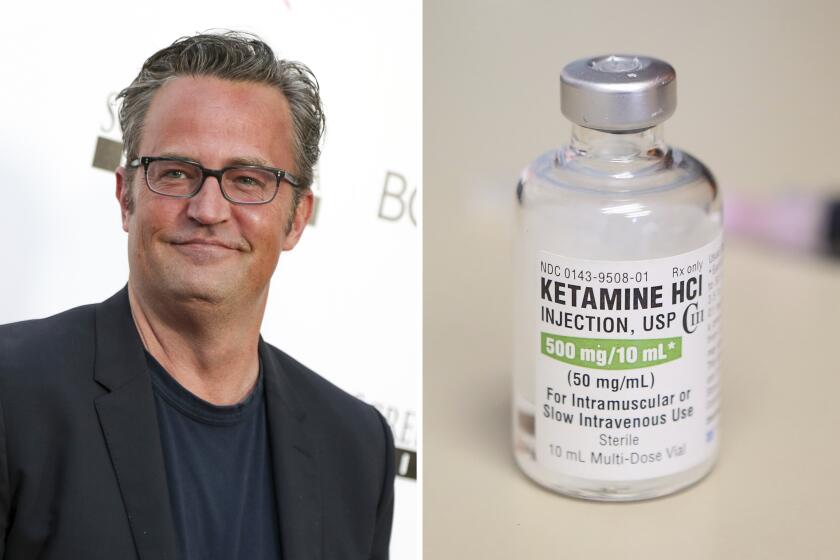Doctor who helped supply Matthew Perry with ketamine pleads guilty

One of two doctors charged with supplying ketamine to Matthew Perry pleaded guilty Wednesday to illegally distributing the surgical anesthetic.
Dr. Mark Chavez is among three defendants who signed a plea deal and are facing lesser charges in Perry’s death, which federal prosecutors chalked up to a conspiracy by multiple individuals to provide the actor with the drug.
The two other defendants who have entered into plea agreements are Perry’s live-in personal assistant, Kenneth Iwamasa, and alleged drug dealer Erik Fleming.
Two other defendants are not cooperating with prosecutors and face far more serious conspiracy charges.
Federal authorities have filed drug charges against five individuals, including two doctors, in connection with the death of ‘Friends’ star Matthew Perry.
Jasveen Sangha, aka the “Ketamine Queen,” presented herself as “a celebrity drug dealer with high quality goods,” according to court documents. She’s accused of supplying Perry’s assistant with ketamine. Dr. Salvador Plasencia, referred to as “Dr. P,” allegedly injected the actor with the drug at his Pacific Palisades home. Both have pleaded not guilty and are set to be tried in March.
During a brief appearance in federal court in Los Angeles on Wednesday, Chavez was asked how he pleaded and replied, “Guilty, your honor.” He is due back for sentencing in April and could face up to 10 years in federal prison. As part of his plea, Chavez agreed to surrender his medical license. He is free on $50,000 bond.
Perry, 54, was found dead in the hot tub of his Pacific Palisades home on Oct. 28. He died from “acute effects of ketamine,” according to the Los Angeles County Medical Examiner’s Office. His death triggered a multiple-agency federal investigation.
Prosecutors last month revealed charges against what U.S. Atty Martin Estrada dubbed a “broad underground criminal network” that supplied the actor.
In late September, about a month before Perry’s death, prosecutors allege, Plasencia learned the actor was interested in obtaining ketamine, a legal medication commonly used as an anesthetic, according to charging documents in the case.
In announcing arrests in the death of “Friends” star Matthew Perry, authorities unveiled a disturbing narrative of the weeks leading up to his final day.
Perry had taken the drug through his regular physician in an off-label treatment for depression. But abusers of the drug use it recreationally, drawn to its dissociative effects.
After learning of Perry’s interest, Plasencia contacted Chavez, who previously operated a ketamine clinic, to obtain the drug to sell to the actor, authorities said. In text messages to Chavez, Plasencia discussed how much to charge Perry for the ketamine, stating, “I wonder how much this moron will pay” and “Let’s find out,” according to court records. The doctors charged Perry $2,000 for a dose that cost Chavez $12, prosecutors allege.
Chavez, as part of the plea agreement, admitted to diverting ketamine from his San Diego clinic to sell to Plasencia. Chavez admitted he lied to a drug distributor and submitted a prescription under the name of a former patient without their consent.
Chavez transferred 22 vials of ketamine and nine ketamine lozenges, which were fraudulently obtained, to Plasencia for sale to Perry. Chavez “was fully aware that selling vials of ketamine to a patient for self-administration was illegal,” according to the plea agreement.
Plasencia, although forbidden by the Drug Enforcement Administration from prescribing controlled substances, continues to practice medicine but must inform patients about the ongoing criminal case.
Plasencia is facing one count of conspiracy to distribute ketamine, seven counts of distribution of ketamine and two counts of altering and falsifying documents or records related to the federal investigation. If convicted, he faces 10 years for each ketamine-related charge and 20 years for each falsification charge.
More to Read
Sign up for Essential California
The most important California stories and recommendations in your inbox every morning.
You may occasionally receive promotional content from the Los Angeles Times.













